Darfur Crisis: Conflict Analysis, Human Rights, and NGO Involvement
VerifiedAdded on 2023/06/08
|9
|1772
|139
Report
AI Summary
This report provides an overview of the ongoing crisis in the Darfur region of Sudan, highlighting the ethnic tensions, oil conflicts, and desertification contributing to the conflict. It examines the Sudanese government's response, including the involvement of international powers like China, and the resulting human rights violations, such as violence, displacement, and abuse. The report also assesses the role of NGOs in providing aid, human rights training, and promoting social stability through income-generating facilities and infrastructure development. The analysis concludes that while NGOs play a crucial role, the intensity of the conflict requires government cooperation and a resolution of underlying issues like ethnic hatred and international interference to achieve lasting peace and prosperity.
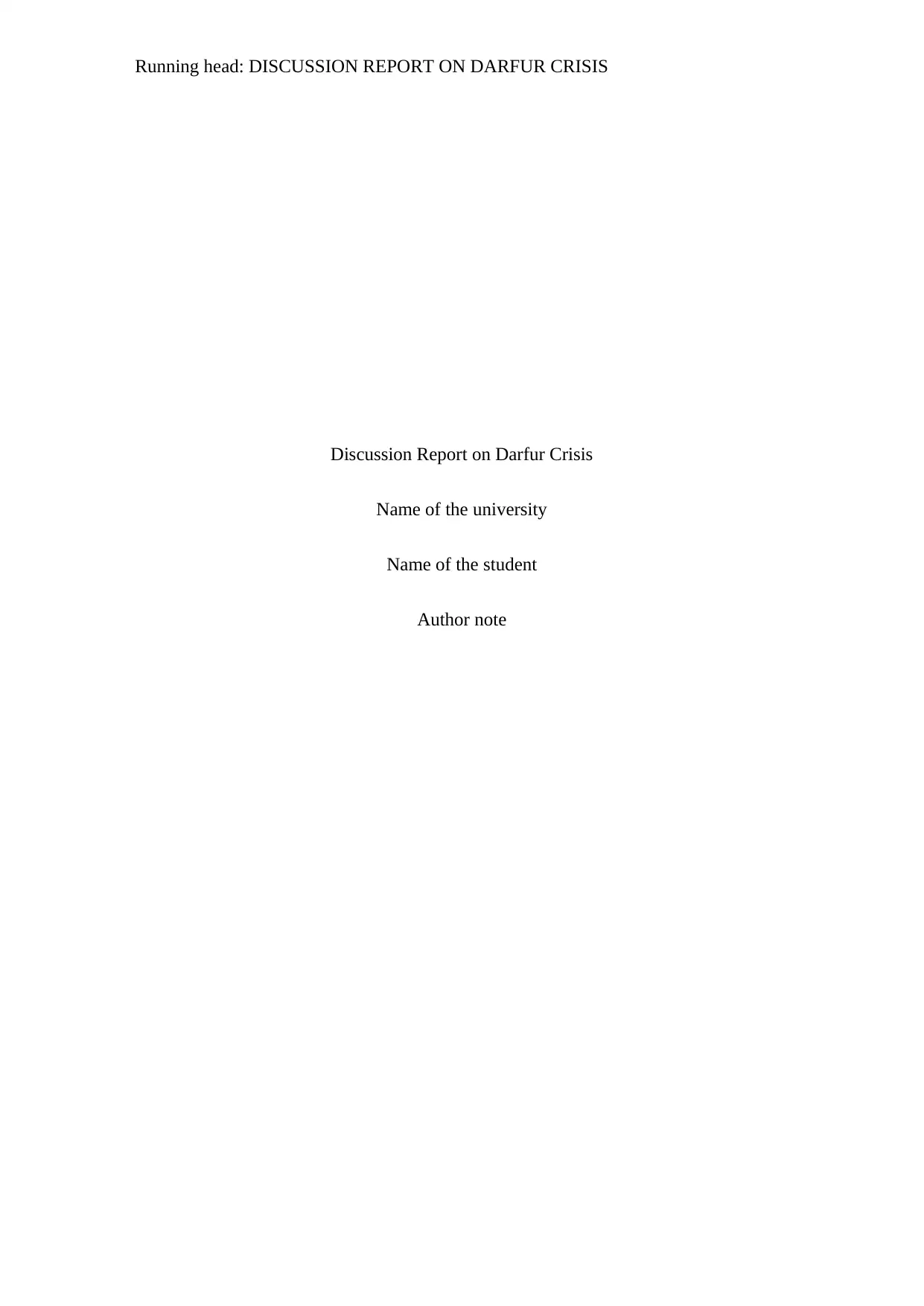
Running head: DISCUSSION REPORT ON DARFUR CRISIS
Discussion Report on Darfur Crisis
Name of the university
Name of the student
Author note
Discussion Report on Darfur Crisis
Name of the university
Name of the student
Author note
Paraphrase This Document
Need a fresh take? Get an instant paraphrase of this document with our AI Paraphraser
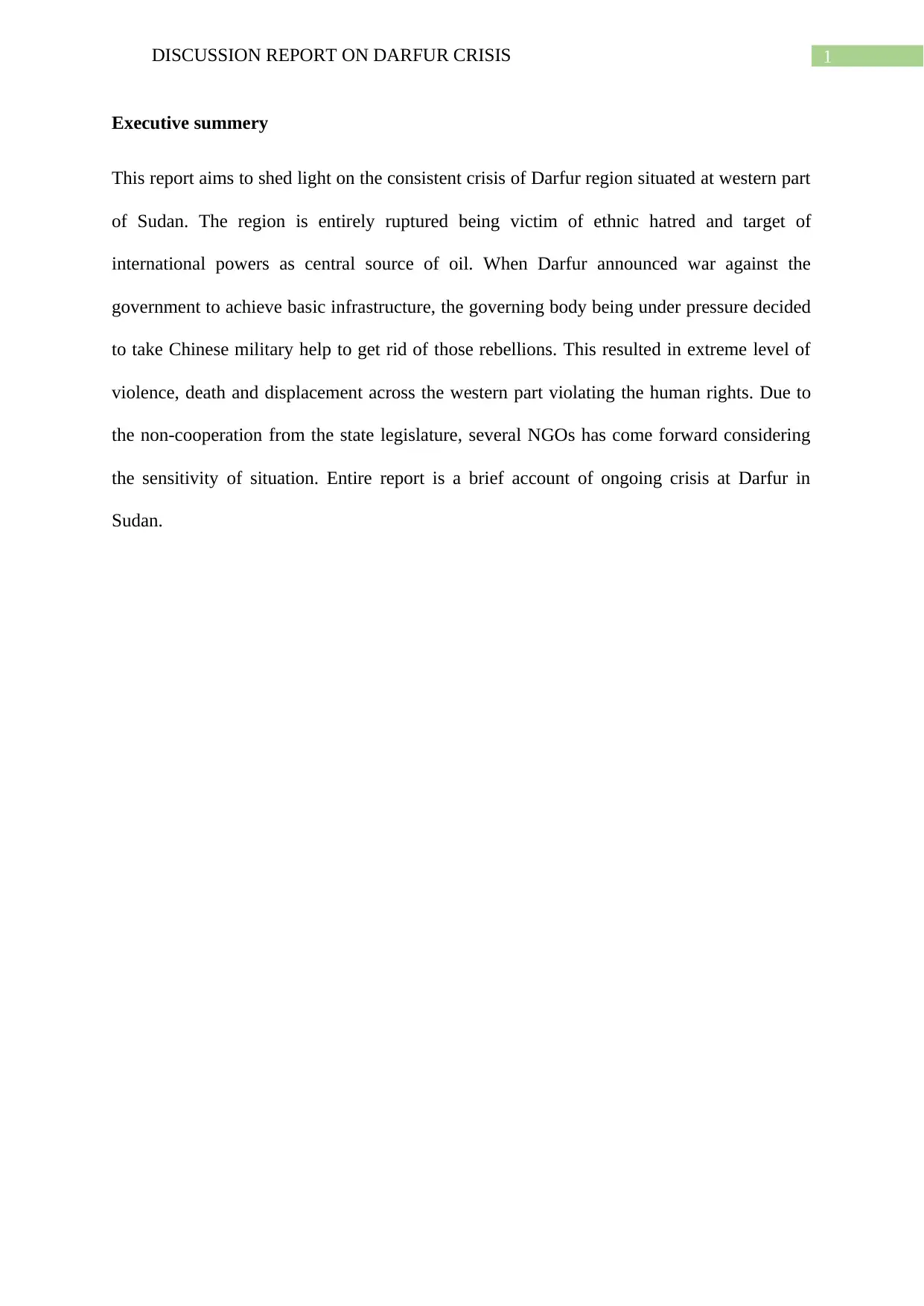
1DISCUSSION REPORT ON DARFUR CRISIS
Executive summery
This report aims to shed light on the consistent crisis of Darfur region situated at western part
of Sudan. The region is entirely ruptured being victim of ethnic hatred and target of
international powers as central source of oil. When Darfur announced war against the
government to achieve basic infrastructure, the governing body being under pressure decided
to take Chinese military help to get rid of those rebellions. This resulted in extreme level of
violence, death and displacement across the western part violating the human rights. Due to
the non-cooperation from the state legislature, several NGOs has come forward considering
the sensitivity of situation. Entire report is a brief account of ongoing crisis at Darfur in
Sudan.
Executive summery
This report aims to shed light on the consistent crisis of Darfur region situated at western part
of Sudan. The region is entirely ruptured being victim of ethnic hatred and target of
international powers as central source of oil. When Darfur announced war against the
government to achieve basic infrastructure, the governing body being under pressure decided
to take Chinese military help to get rid of those rebellions. This resulted in extreme level of
violence, death and displacement across the western part violating the human rights. Due to
the non-cooperation from the state legislature, several NGOs has come forward considering
the sensitivity of situation. Entire report is a brief account of ongoing crisis at Darfur in
Sudan.
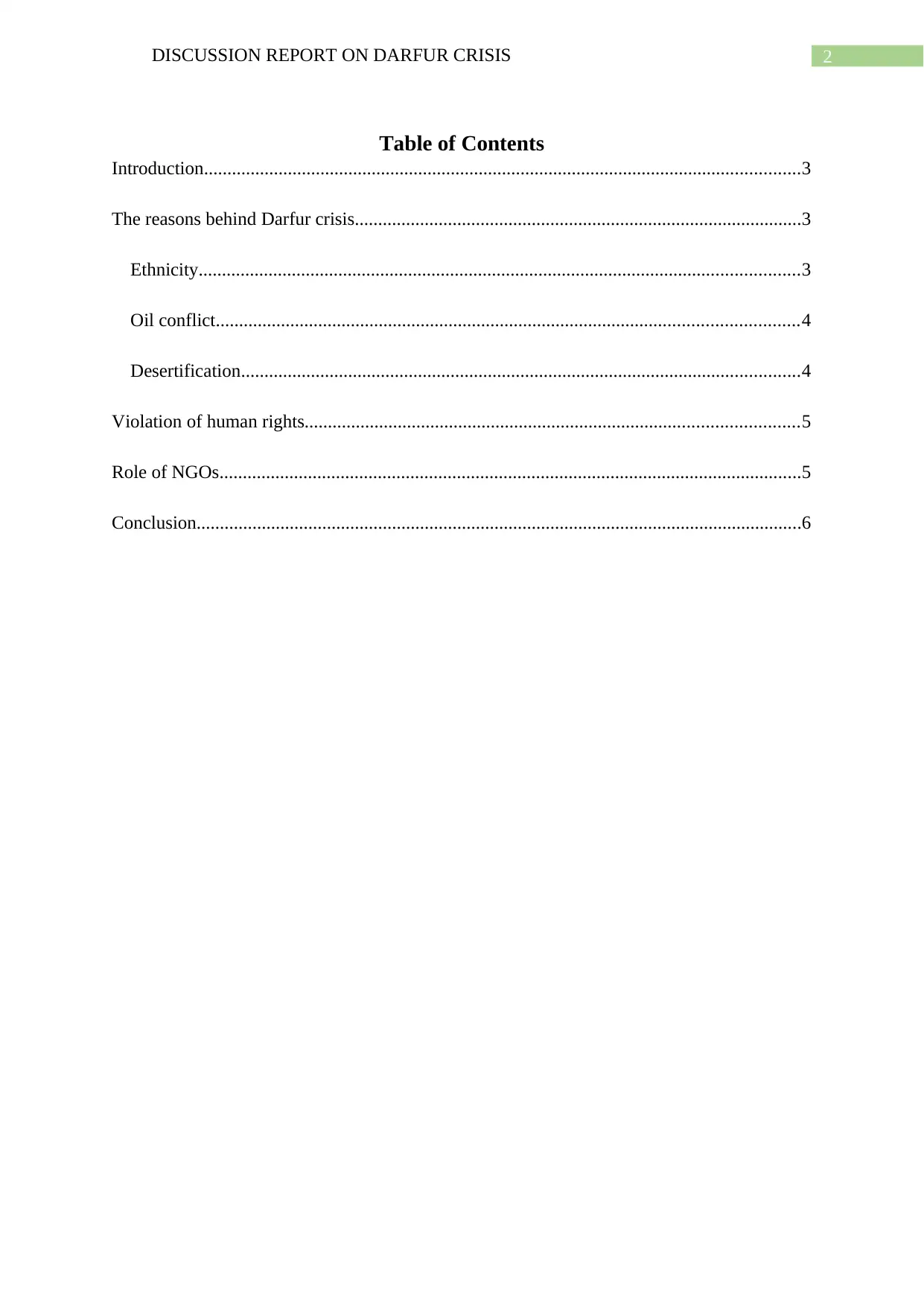
2DISCUSSION REPORT ON DARFUR CRISIS
Table of Contents
Introduction................................................................................................................................3
The reasons behind Darfur crisis................................................................................................3
Ethnicity.................................................................................................................................3
Oil conflict.............................................................................................................................4
Desertification........................................................................................................................4
Violation of human rights..........................................................................................................5
Role of NGOs.............................................................................................................................5
Conclusion..................................................................................................................................6
Table of Contents
Introduction................................................................................................................................3
The reasons behind Darfur crisis................................................................................................3
Ethnicity.................................................................................................................................3
Oil conflict.............................................................................................................................4
Desertification........................................................................................................................4
Violation of human rights..........................................................................................................5
Role of NGOs.............................................................................................................................5
Conclusion..................................................................................................................................6
⊘ This is a preview!⊘
Do you want full access?
Subscribe today to unlock all pages.

Trusted by 1+ million students worldwide
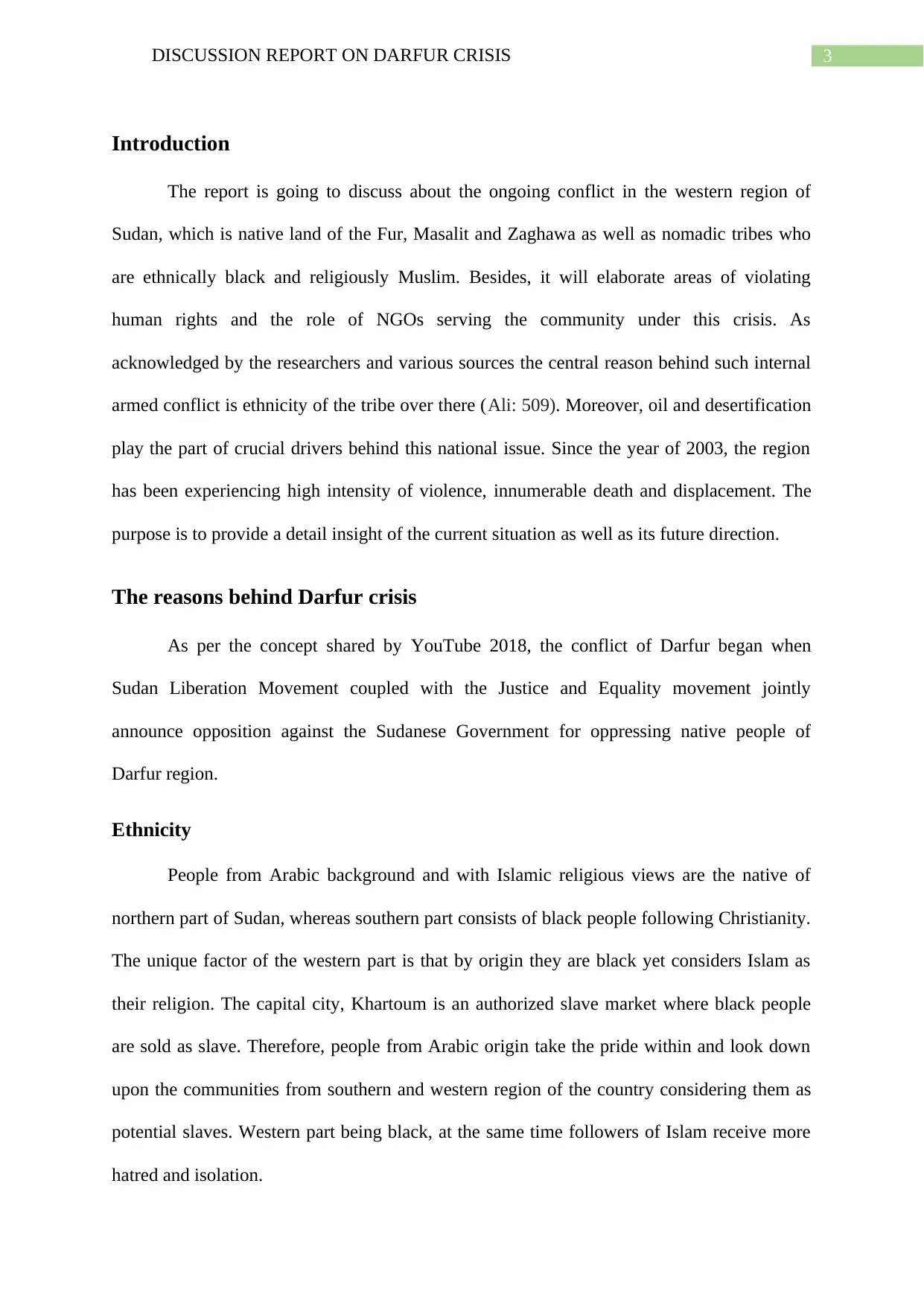
3DISCUSSION REPORT ON DARFUR CRISIS
Introduction
The report is going to discuss about the ongoing conflict in the western region of
Sudan, which is native land of the Fur, Masalit and Zaghawa as well as nomadic tribes who
are ethnically black and religiously Muslim. Besides, it will elaborate areas of violating
human rights and the role of NGOs serving the community under this crisis. As
acknowledged by the researchers and various sources the central reason behind such internal
armed conflict is ethnicity of the tribe over there (Ali: 509). Moreover, oil and desertification
play the part of crucial drivers behind this national issue. Since the year of 2003, the region
has been experiencing high intensity of violence, innumerable death and displacement. The
purpose is to provide a detail insight of the current situation as well as its future direction.
The reasons behind Darfur crisis
As per the concept shared by YouTube 2018, the conflict of Darfur began when
Sudan Liberation Movement coupled with the Justice and Equality movement jointly
announce opposition against the Sudanese Government for oppressing native people of
Darfur region.
Ethnicity
People from Arabic background and with Islamic religious views are the native of
northern part of Sudan, whereas southern part consists of black people following Christianity.
The unique factor of the western part is that by origin they are black yet considers Islam as
their religion. The capital city, Khartoum is an authorized slave market where black people
are sold as slave. Therefore, people from Arabic origin take the pride within and look down
upon the communities from southern and western region of the country considering them as
potential slaves. Western part being black, at the same time followers of Islam receive more
hatred and isolation.
Introduction
The report is going to discuss about the ongoing conflict in the western region of
Sudan, which is native land of the Fur, Masalit and Zaghawa as well as nomadic tribes who
are ethnically black and religiously Muslim. Besides, it will elaborate areas of violating
human rights and the role of NGOs serving the community under this crisis. As
acknowledged by the researchers and various sources the central reason behind such internal
armed conflict is ethnicity of the tribe over there (Ali: 509). Moreover, oil and desertification
play the part of crucial drivers behind this national issue. Since the year of 2003, the region
has been experiencing high intensity of violence, innumerable death and displacement. The
purpose is to provide a detail insight of the current situation as well as its future direction.
The reasons behind Darfur crisis
As per the concept shared by YouTube 2018, the conflict of Darfur began when
Sudan Liberation Movement coupled with the Justice and Equality movement jointly
announce opposition against the Sudanese Government for oppressing native people of
Darfur region.
Ethnicity
People from Arabic background and with Islamic religious views are the native of
northern part of Sudan, whereas southern part consists of black people following Christianity.
The unique factor of the western part is that by origin they are black yet considers Islam as
their religion. The capital city, Khartoum is an authorized slave market where black people
are sold as slave. Therefore, people from Arabic origin take the pride within and look down
upon the communities from southern and western region of the country considering them as
potential slaves. Western part being black, at the same time followers of Islam receive more
hatred and isolation.
Paraphrase This Document
Need a fresh take? Get an instant paraphrase of this document with our AI Paraphraser
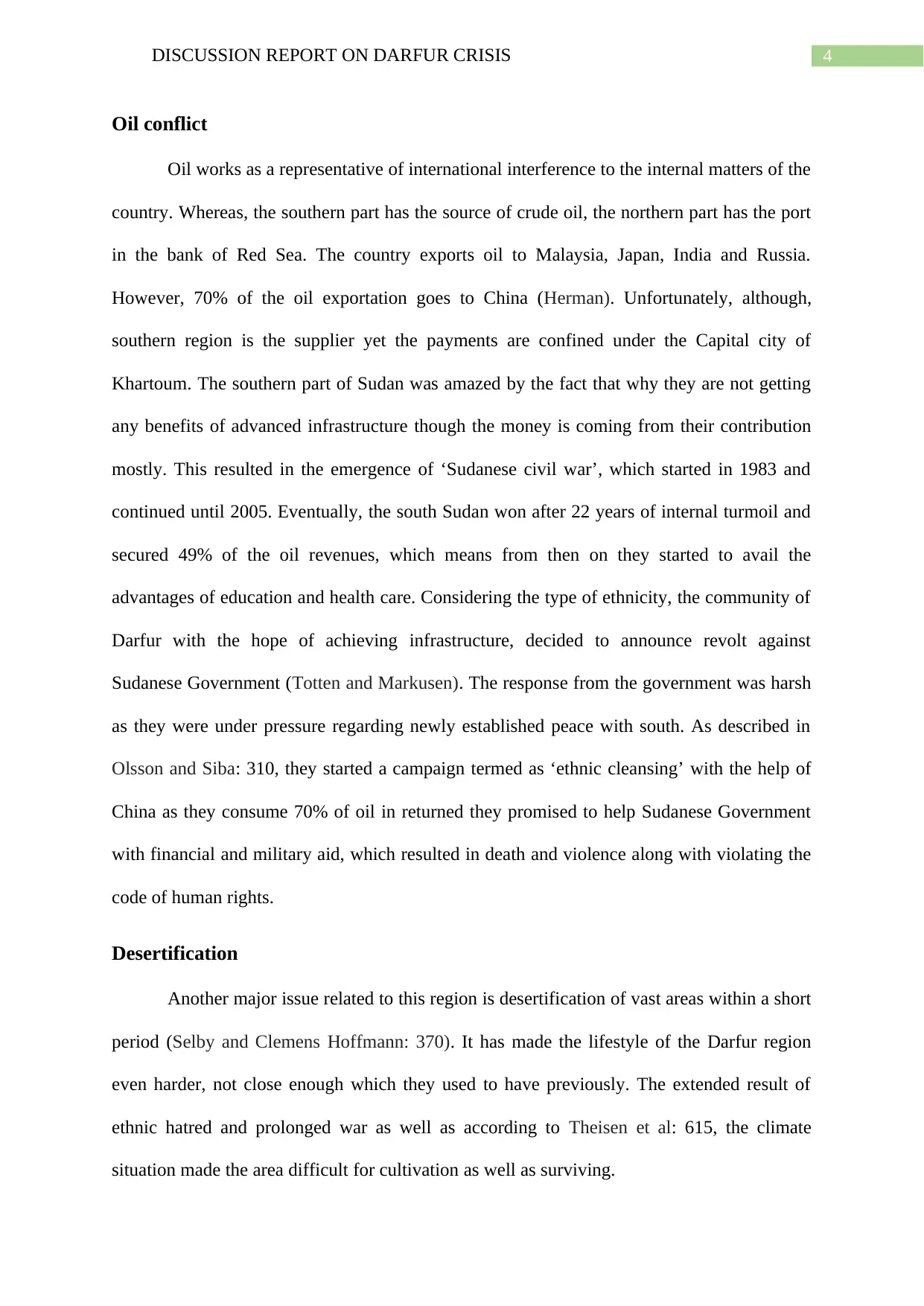
4DISCUSSION REPORT ON DARFUR CRISIS
Oil conflict
Oil works as a representative of international interference to the internal matters of the
country. Whereas, the southern part has the source of crude oil, the northern part has the port
in the bank of Red Sea. The country exports oil to Malaysia, Japan, India and Russia.
However, 70% of the oil exportation goes to China (Herman). Unfortunately, although,
southern region is the supplier yet the payments are confined under the Capital city of
Khartoum. The southern part of Sudan was amazed by the fact that why they are not getting
any benefits of advanced infrastructure though the money is coming from their contribution
mostly. This resulted in the emergence of ‘Sudanese civil war’, which started in 1983 and
continued until 2005. Eventually, the south Sudan won after 22 years of internal turmoil and
secured 49% of the oil revenues, which means from then on they started to avail the
advantages of education and health care. Considering the type of ethnicity, the community of
Darfur with the hope of achieving infrastructure, decided to announce revolt against
Sudanese Government (Totten and Markusen). The response from the government was harsh
as they were under pressure regarding newly established peace with south. As described in
Olsson and Siba: 310, they started a campaign termed as ‘ethnic cleansing’ with the help of
China as they consume 70% of oil in returned they promised to help Sudanese Government
with financial and military aid, which resulted in death and violence along with violating the
code of human rights.
Desertification
Another major issue related to this region is desertification of vast areas within a short
period (Selby and Clemens Hoffmann: 370). It has made the lifestyle of the Darfur region
even harder, not close enough which they used to have previously. The extended result of
ethnic hatred and prolonged war as well as according to Theisen et al: 615, the climate
situation made the area difficult for cultivation as well as surviving.
Oil conflict
Oil works as a representative of international interference to the internal matters of the
country. Whereas, the southern part has the source of crude oil, the northern part has the port
in the bank of Red Sea. The country exports oil to Malaysia, Japan, India and Russia.
However, 70% of the oil exportation goes to China (Herman). Unfortunately, although,
southern region is the supplier yet the payments are confined under the Capital city of
Khartoum. The southern part of Sudan was amazed by the fact that why they are not getting
any benefits of advanced infrastructure though the money is coming from their contribution
mostly. This resulted in the emergence of ‘Sudanese civil war’, which started in 1983 and
continued until 2005. Eventually, the south Sudan won after 22 years of internal turmoil and
secured 49% of the oil revenues, which means from then on they started to avail the
advantages of education and health care. Considering the type of ethnicity, the community of
Darfur with the hope of achieving infrastructure, decided to announce revolt against
Sudanese Government (Totten and Markusen). The response from the government was harsh
as they were under pressure regarding newly established peace with south. As described in
Olsson and Siba: 310, they started a campaign termed as ‘ethnic cleansing’ with the help of
China as they consume 70% of oil in returned they promised to help Sudanese Government
with financial and military aid, which resulted in death and violence along with violating the
code of human rights.
Desertification
Another major issue related to this region is desertification of vast areas within a short
period (Selby and Clemens Hoffmann: 370). It has made the lifestyle of the Darfur region
even harder, not close enough which they used to have previously. The extended result of
ethnic hatred and prolonged war as well as according to Theisen et al: 615, the climate
situation made the area difficult for cultivation as well as surviving.
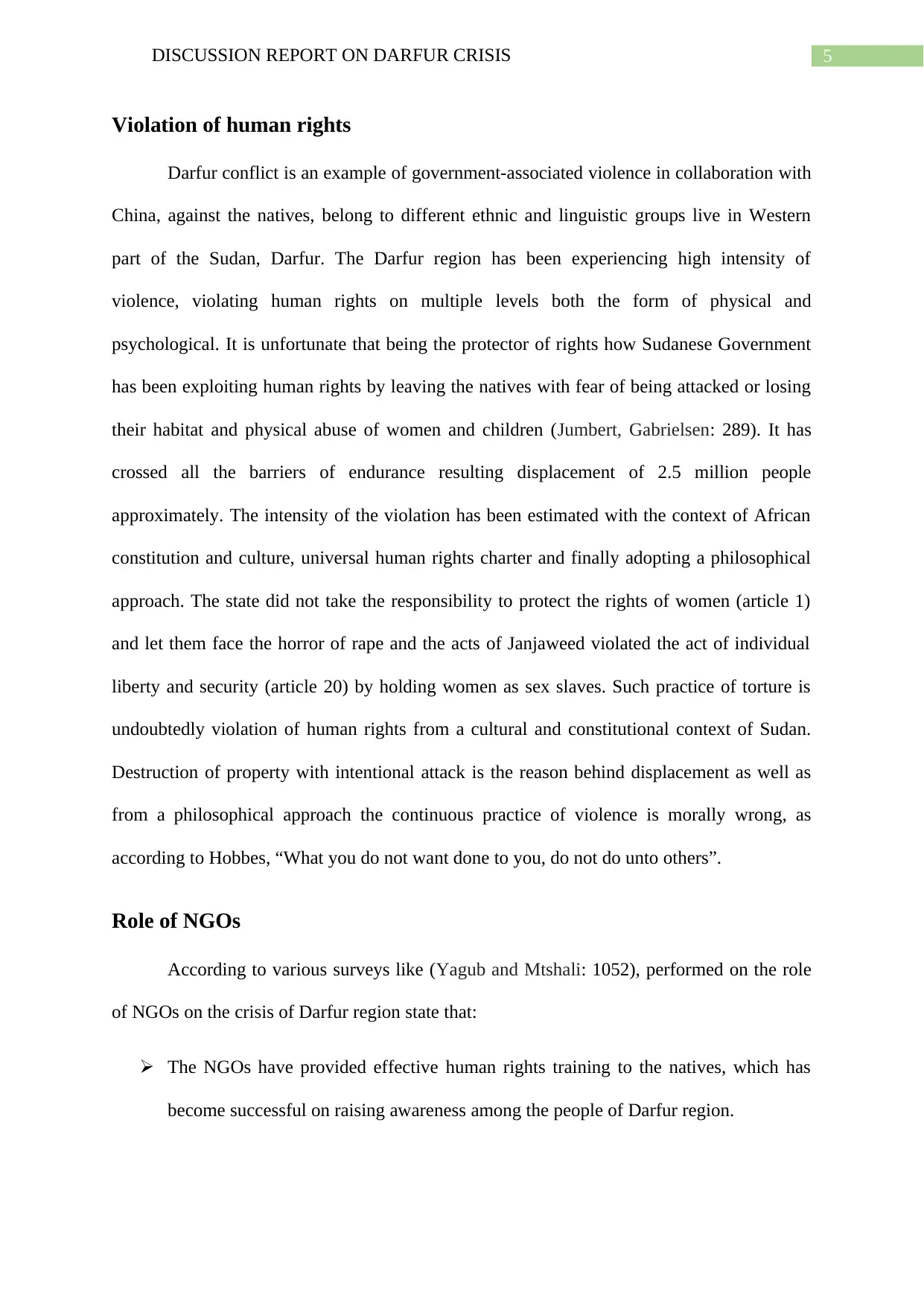
5DISCUSSION REPORT ON DARFUR CRISIS
Violation of human rights
Darfur conflict is an example of government-associated violence in collaboration with
China, against the natives, belong to different ethnic and linguistic groups live in Western
part of the Sudan, Darfur. The Darfur region has been experiencing high intensity of
violence, violating human rights on multiple levels both the form of physical and
psychological. It is unfortunate that being the protector of rights how Sudanese Government
has been exploiting human rights by leaving the natives with fear of being attacked or losing
their habitat and physical abuse of women and children (Jumbert, Gabrielsen: 289). It has
crossed all the barriers of endurance resulting displacement of 2.5 million people
approximately. The intensity of the violation has been estimated with the context of African
constitution and culture, universal human rights charter and finally adopting a philosophical
approach. The state did not take the responsibility to protect the rights of women (article 1)
and let them face the horror of rape and the acts of Janjaweed violated the act of individual
liberty and security (article 20) by holding women as sex slaves. Such practice of torture is
undoubtedly violation of human rights from a cultural and constitutional context of Sudan.
Destruction of property with intentional attack is the reason behind displacement as well as
from a philosophical approach the continuous practice of violence is morally wrong, as
according to Hobbes, “What you do not want done to you, do not do unto others”.
Role of NGOs
According to various surveys like (Yagub and Mtshali: 1052), performed on the role
of NGOs on the crisis of Darfur region state that:
The NGOs have provided effective human rights training to the natives, which has
become successful on raising awareness among the people of Darfur region.
Violation of human rights
Darfur conflict is an example of government-associated violence in collaboration with
China, against the natives, belong to different ethnic and linguistic groups live in Western
part of the Sudan, Darfur. The Darfur region has been experiencing high intensity of
violence, violating human rights on multiple levels both the form of physical and
psychological. It is unfortunate that being the protector of rights how Sudanese Government
has been exploiting human rights by leaving the natives with fear of being attacked or losing
their habitat and physical abuse of women and children (Jumbert, Gabrielsen: 289). It has
crossed all the barriers of endurance resulting displacement of 2.5 million people
approximately. The intensity of the violation has been estimated with the context of African
constitution and culture, universal human rights charter and finally adopting a philosophical
approach. The state did not take the responsibility to protect the rights of women (article 1)
and let them face the horror of rape and the acts of Janjaweed violated the act of individual
liberty and security (article 20) by holding women as sex slaves. Such practice of torture is
undoubtedly violation of human rights from a cultural and constitutional context of Sudan.
Destruction of property with intentional attack is the reason behind displacement as well as
from a philosophical approach the continuous practice of violence is morally wrong, as
according to Hobbes, “What you do not want done to you, do not do unto others”.
Role of NGOs
According to various surveys like (Yagub and Mtshali: 1052), performed on the role
of NGOs on the crisis of Darfur region state that:
The NGOs have provided effective human rights training to the natives, which has
become successful on raising awareness among the people of Darfur region.
⊘ This is a preview!⊘
Do you want full access?
Subscribe today to unlock all pages.

Trusted by 1+ million students worldwide
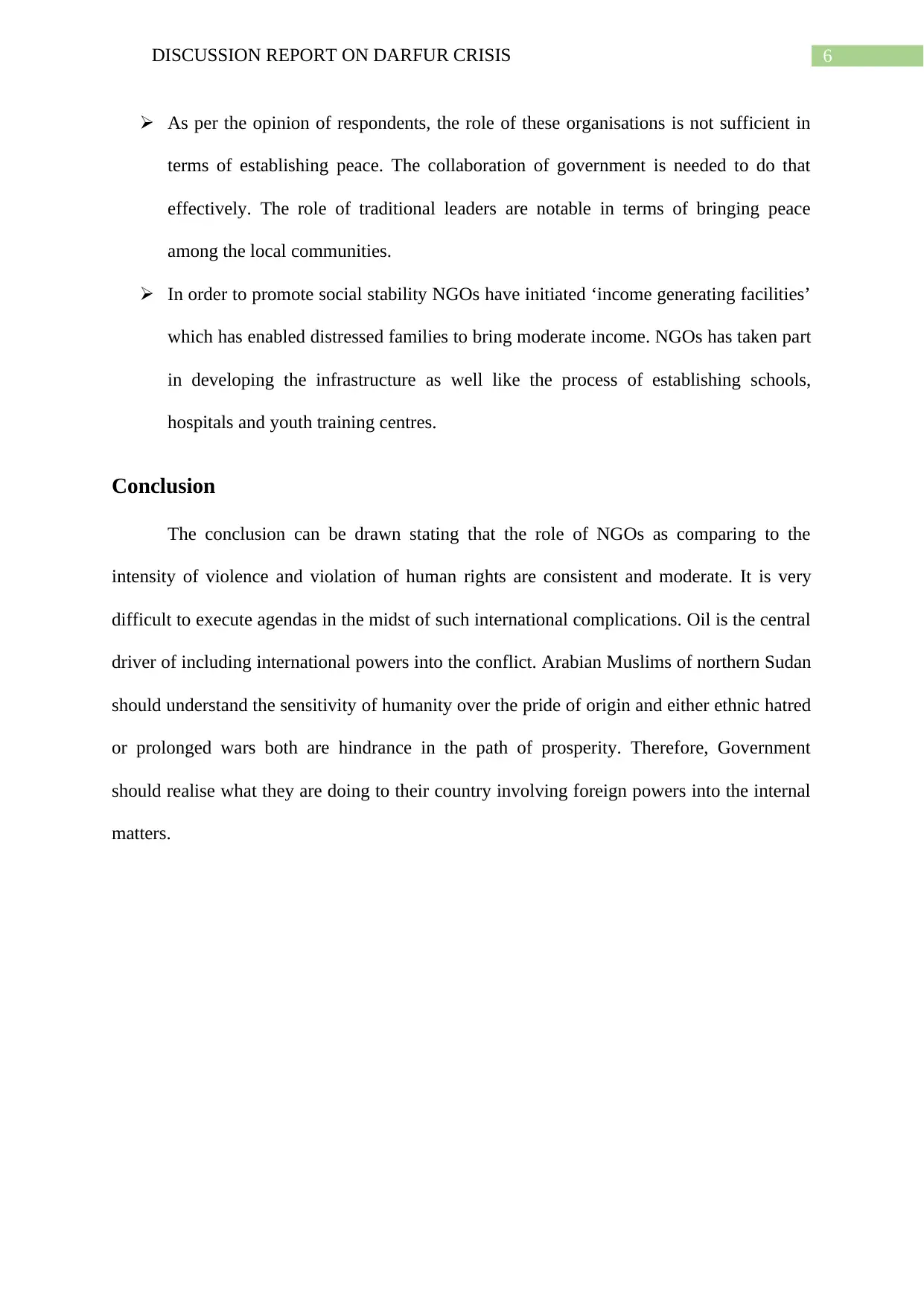
6DISCUSSION REPORT ON DARFUR CRISIS
As per the opinion of respondents, the role of these organisations is not sufficient in
terms of establishing peace. The collaboration of government is needed to do that
effectively. The role of traditional leaders are notable in terms of bringing peace
among the local communities.
In order to promote social stability NGOs have initiated ‘income generating facilities’
which has enabled distressed families to bring moderate income. NGOs has taken part
in developing the infrastructure as well like the process of establishing schools,
hospitals and youth training centres.
Conclusion
The conclusion can be drawn stating that the role of NGOs as comparing to the
intensity of violence and violation of human rights are consistent and moderate. It is very
difficult to execute agendas in the midst of such international complications. Oil is the central
driver of including international powers into the conflict. Arabian Muslims of northern Sudan
should understand the sensitivity of humanity over the pride of origin and either ethnic hatred
or prolonged wars both are hindrance in the path of prosperity. Therefore, Government
should realise what they are doing to their country involving foreign powers into the internal
matters.
As per the opinion of respondents, the role of these organisations is not sufficient in
terms of establishing peace. The collaboration of government is needed to do that
effectively. The role of traditional leaders are notable in terms of bringing peace
among the local communities.
In order to promote social stability NGOs have initiated ‘income generating facilities’
which has enabled distressed families to bring moderate income. NGOs has taken part
in developing the infrastructure as well like the process of establishing schools,
hospitals and youth training centres.
Conclusion
The conclusion can be drawn stating that the role of NGOs as comparing to the
intensity of violence and violation of human rights are consistent and moderate. It is very
difficult to execute agendas in the midst of such international complications. Oil is the central
driver of including international powers into the conflict. Arabian Muslims of northern Sudan
should understand the sensitivity of humanity over the pride of origin and either ethnic hatred
or prolonged wars both are hindrance in the path of prosperity. Therefore, Government
should realise what they are doing to their country involving foreign powers into the internal
matters.
Paraphrase This Document
Need a fresh take? Get an instant paraphrase of this document with our AI Paraphraser
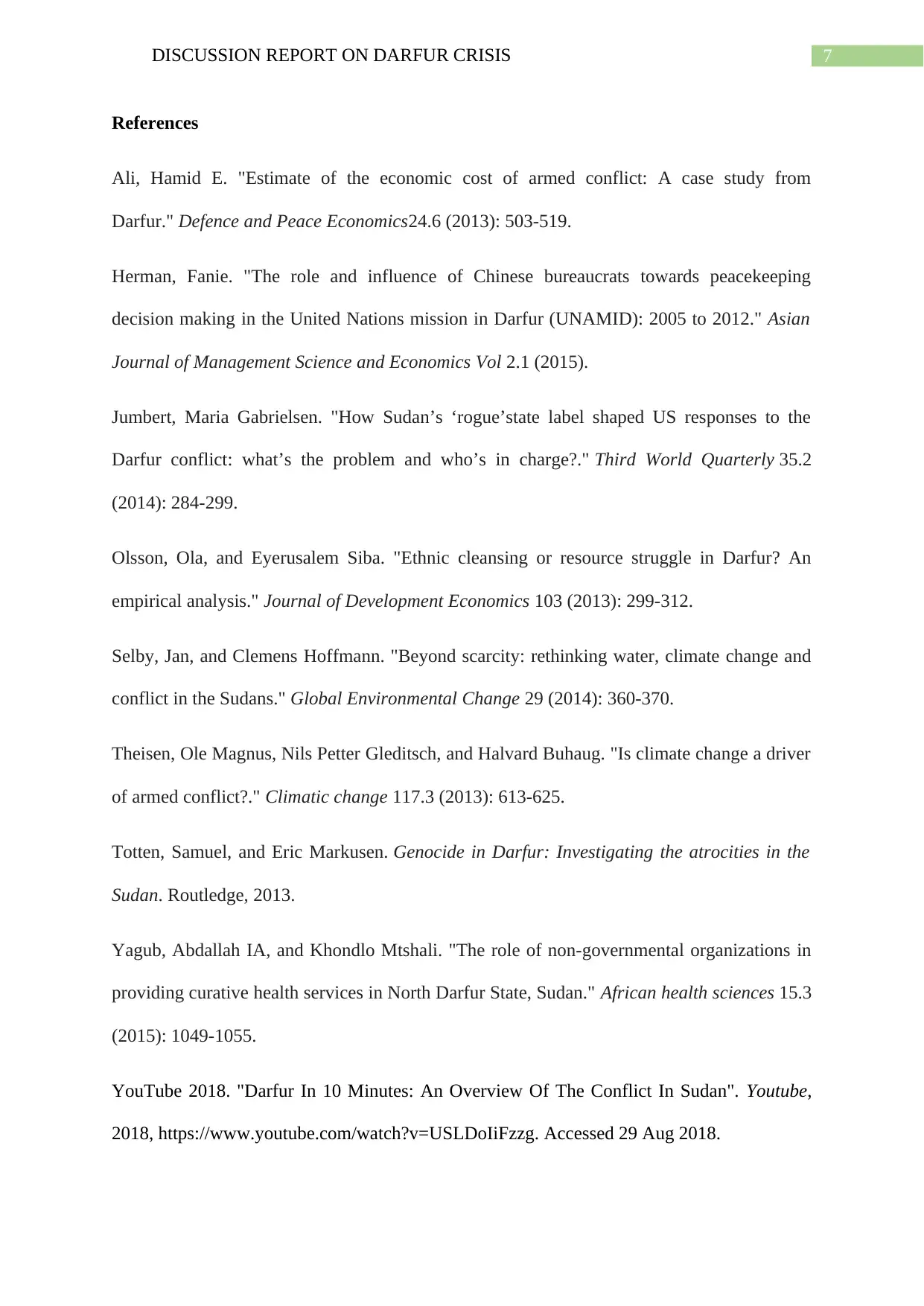
7DISCUSSION REPORT ON DARFUR CRISIS
References
Ali, Hamid E. "Estimate of the economic cost of armed conflict: A case study from
Darfur." Defence and Peace Economics24.6 (2013): 503-519.
Herman, Fanie. "The role and influence of Chinese bureaucrats towards peacekeeping
decision making in the United Nations mission in Darfur (UNAMID): 2005 to 2012." Asian
Journal of Management Science and Economics Vol 2.1 (2015).
Jumbert, Maria Gabrielsen. "How Sudan’s ‘rogue’state label shaped US responses to the
Darfur conflict: what’s the problem and who’s in charge?." Third World Quarterly 35.2
(2014): 284-299.
Olsson, Ola, and Eyerusalem Siba. "Ethnic cleansing or resource struggle in Darfur? An
empirical analysis." Journal of Development Economics 103 (2013): 299-312.
Selby, Jan, and Clemens Hoffmann. "Beyond scarcity: rethinking water, climate change and
conflict in the Sudans." Global Environmental Change 29 (2014): 360-370.
Theisen, Ole Magnus, Nils Petter Gleditsch, and Halvard Buhaug. "Is climate change a driver
of armed conflict?." Climatic change 117.3 (2013): 613-625.
Totten, Samuel, and Eric Markusen. Genocide in Darfur: Investigating the atrocities in the
Sudan. Routledge, 2013.
Yagub, Abdallah IA, and Khondlo Mtshali. "The role of non-governmental organizations in
providing curative health services in North Darfur State, Sudan." African health sciences 15.3
(2015): 1049-1055.
YouTube 2018. "Darfur In 10 Minutes: An Overview Of The Conflict In Sudan". Youtube,
2018, https://www.youtube.com/watch?v=USLDoIiFzzg. Accessed 29 Aug 2018.
References
Ali, Hamid E. "Estimate of the economic cost of armed conflict: A case study from
Darfur." Defence and Peace Economics24.6 (2013): 503-519.
Herman, Fanie. "The role and influence of Chinese bureaucrats towards peacekeeping
decision making in the United Nations mission in Darfur (UNAMID): 2005 to 2012." Asian
Journal of Management Science and Economics Vol 2.1 (2015).
Jumbert, Maria Gabrielsen. "How Sudan’s ‘rogue’state label shaped US responses to the
Darfur conflict: what’s the problem and who’s in charge?." Third World Quarterly 35.2
(2014): 284-299.
Olsson, Ola, and Eyerusalem Siba. "Ethnic cleansing or resource struggle in Darfur? An
empirical analysis." Journal of Development Economics 103 (2013): 299-312.
Selby, Jan, and Clemens Hoffmann. "Beyond scarcity: rethinking water, climate change and
conflict in the Sudans." Global Environmental Change 29 (2014): 360-370.
Theisen, Ole Magnus, Nils Petter Gleditsch, and Halvard Buhaug. "Is climate change a driver
of armed conflict?." Climatic change 117.3 (2013): 613-625.
Totten, Samuel, and Eric Markusen. Genocide in Darfur: Investigating the atrocities in the
Sudan. Routledge, 2013.
Yagub, Abdallah IA, and Khondlo Mtshali. "The role of non-governmental organizations in
providing curative health services in North Darfur State, Sudan." African health sciences 15.3
(2015): 1049-1055.
YouTube 2018. "Darfur In 10 Minutes: An Overview Of The Conflict In Sudan". Youtube,
2018, https://www.youtube.com/watch?v=USLDoIiFzzg. Accessed 29 Aug 2018.

8DISCUSSION REPORT ON DARFUR CRISIS
⊘ This is a preview!⊘
Do you want full access?
Subscribe today to unlock all pages.

Trusted by 1+ million students worldwide
1 out of 9
Your All-in-One AI-Powered Toolkit for Academic Success.
+13062052269
info@desklib.com
Available 24*7 on WhatsApp / Email
![[object Object]](/_next/static/media/star-bottom.7253800d.svg)
Unlock your academic potential
Copyright © 2020–2026 A2Z Services. All Rights Reserved. Developed and managed by ZUCOL.
